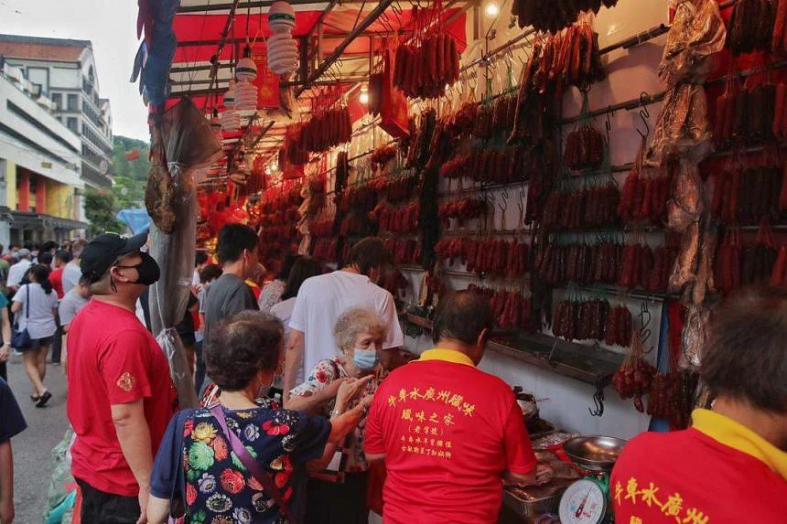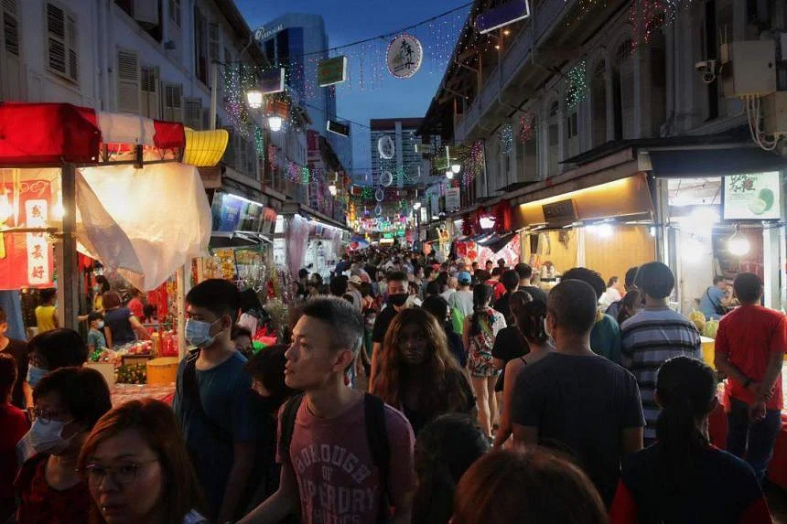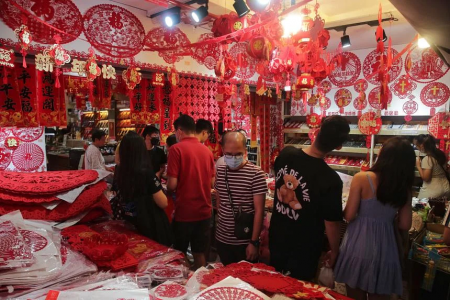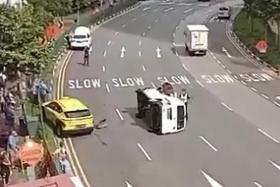Crowds throng Chinatown as CNY bazaar returns after 2-year hiatus
Crowds of people have started streaming into Chinatown as the Festive Fair – the annual Chinese New Year bazaar – is back after a two-year hiatus.
Eager sellers at many of the 280 stalls set up in Smith Street, Pagoda Street, Trengganu Street and Temple Street peddle a medley of festive goods, from Chinese New Year snacks to Chinese sausages.
Most stalls were occupied by sellers, especially at the crossroads of the streets, but some at both ends of Temple Street were seen vacant.
The Festive Fair is part of the Chinatown Chinese New Year Celebration 2023, which is organised by the Chinatown Festival Committee and supported by the Singapore Tourism Board.
It started last Sunday and will run until Jan 21. The official opening hours are 6pm to 10pm, but most stalls open earlier.
When The Sunday Times visited at 3pm on Saturday, shoppers were seen along Pagoda, Temple and Smith streets, snapping up Chinese New Year decorations and snacks.
Despite the goods and services tax hike, inflation and rising cost of goods, some stall owners kept the prices of previous years.
A stall owner selling dried persimmons, who wanted to be known only as Ah Hui, said he did not increase the price of his goods despite rising costs.
“I have a lot of regular customers... Not increasing the price is my way of giving back to them,” said Ah Hui, who sells 1kg of dried persimmons for about $12.
Other stall owners ST spoke to said they did not pass rising shipping costs to their customers.
But not all stall owners kept their old prices.
At Chinatown Ah Keong Guangzhou Sausages in Smith Street, the price of Chinese sausages has risen by $3 to $5 per kg – they now cost about $40 per kg.
Stall owner Yip Wai Keong attributed the increase to rising manpower and ingredient costs.
He said he has seen his sales increase by about 20 per cent to 25 per cent compared with a year ago, when he rented a shop in Chinatown to sell the sausages since the bazaar was cancelled. The festive season is the only time of the year he sells lap cheong – Chinese sausages.

But the rise in prices has not deterred shoppers like retiree Tan Tak Hwee, who was excited to enjoy the festivities after the two-year hiatus.
“I’ve been here for about six hours and I still can’t bear to go home,” said the 76-year-old, who bought Chinese New Year snacks there.
While he has noticed a slight increase in prices, Mr Tan, who visited the bazaar every year before Covid-19, said: “Chinese New Year happens only once a year. Regardless of the economy, I will still do some Chinese New Year shopping to celebrate the festival.”

Ms Felicia Wong, who was at the bazaar with her family of three, specially made a visit to Chinatown to buy CNY decorations because of the variety on offer.
“Prices have increased this Chinese New Year, but we will just have to watch what we buy,” said the 45-year-old housewife.
Things were, however, quiet at the end of Temple Street, where some stalls were seen unoccupied.
Some sellers said the location has led to slow business.
Stall owner Joanne Wong, who sells blankets and towels there, said her stall is not only far from the buzzing centre of the street, but also surrounded by vacant stalls that do not attract shoppers.
“There are more people today than Friday, probably because it is the weekend,” she said.
“On Friday, the area here was so empty and business was so slow that I could not even cover the rental fee for the day.”
Her rental fee is about $400 to $500 a day, she said.
She added that despite a rise in shipping costs and inflation, she has not raised the prices of the items she is selling.
Ms Wong, who also set up her stall at the bazaar before the pandemic, attributed the slow business to consumers turning to online shopping during Covid-19 as well.
“I hope there will be more business in the next two weeks leading to Chinese New Year,” she said.
“At this point, I just hope to break even.”
Get The New Paper on your phone with the free TNP app. Download from the Apple App Store or Google Play Store now


